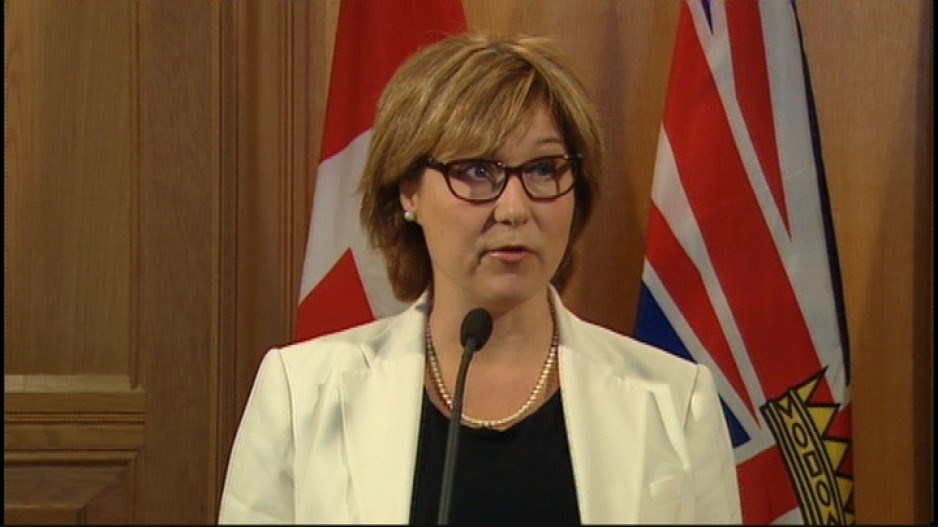The premiers of B.C. and Alberta are squaring off over B.C. environment minister Terry Lake's statement yesterday that an 8% share of the economic benefits of the Northern Gateway pipeline is not enough.
"Given that B.C. would shoulder 100% of the marine risk and a significant portion of the land-based risk, we do not feel the current approach to sharing these benefits is appropriate," Lake said Monday at a press conference, in which he laid out B.C.'s bottom line for supporting a $6 billion pipeline proposed by Enbridge Inc. (TSX:ENB).
But just how much Enbridge will have to pay for the B.C. government to sign off on the project is unknown.
"What the number is remains to be seen," Lake said, when asked to put a number to the new policy position.
"The discussion over the fair share of benefits will take place between the premier … and prime minister and other parties that are involved in this process."
Now the premiers of B.C. and Alberta are sparring over how to divide the revenues from Enbridge's proposed Northern Gateway pipeline.
B.C. Premier Christy Clark told CBC Radio Tuesday morning that the province will only approve the project if it gets its fair share of the revenue from the proposed crude oil pipeline, in order to compensate the province for taking on the majority of the environmental risk.
"Alberta's interests in this are pretty obvious. Alberta gets the large bulk of the benefits, takes very little of the risk. B.C. takes most of the risk and we get very few of the benefits. So I think it's pretty obvious that we have some talking to do here," said Clark.
But Premier Alison Redford said in a statement Monday that B.C. is pitting one province against another, rather than doing what is best for Canada as a whole.
"Leadership is not about dividing Canadians and pitting one province against another. Leadership is about working together. That's when our country benefits, that's when Canada leads," said Redford.
Getting more of the financial benefits of the pipeline project is one of five conditions the B.C. government wants met before it rubber-stamps the proposal.
However, two of those conditions are required in any case. They include satisfying the requirements of an environmental review and giving First Nations in the B.C. the opportunity to participate in the pipeline proposal.
Enbridge insists it has already consulted with First Nations in the pipeline corridor, and claims 60% have signed equity agreements that would see the signatories owning a 10% share in the pipeline and its revenues.
Aboriginal Relations and Reconciliation Minister Mary Polak disputes those assertions. On the B.C. side of the border, there appears to be little support for the pipeline.
"We're not aware of any First Nation in British Columbia that has taken a positive supportive position of the Enbridge proposal at this stage," Polak said.
In a recent interview with Business in Vancouver, Janet Holder, executive vice-president of Western Access for Enbridge, said First Nations who have signed agreements are reluctant to publicly declare they have done so, for fear of being harassed by environmentalists and other First Nations.
Even if Enbridge fulfills B.C.'s requirements to fully consult with First Nations, that doesn't mean any of them have to approve the project for B.C. to support it or for the federal government to give it the green light.
The 1,177-kilometre twin pipeline would carry up to 525,000 barrels of oil per day from the Alberta oilsands to a new marine terminal at Kitimat, and 193,000 barrels per day of condensate from Kitimat to the oilsands.
A recent damning report on an oil spill in the U.S. from an Enbridge pipeline has weakened the company's position in B.C. The biggest concern is not a spill on land, however, but off the coast. Enbridge would be responsible for prevention and cleanup if a spill were to occur on land, but not if it occurs off the B.C. coast.
Lake said one of the conditions B.C. will insist on is "world-class marine and land-based spill prevention, response and recovery systems."
Enbridge Friday announced a $500-million bump in funding to improve safety of the Northern Gateway pipeline, bringing the $5.5 billion project up to $6 billion.
Enbridge would increase the thickness of the steel pipes for the more vulnerable or environmentally sensitive areas, and would install an additional 50 remote-controlled valves that could be shut off in the event of a spill.
The two premiers are expected to meet in Halifax this week, but Alberta's strong reaction to B.C.'s proposal on Monday could lead to some tension in the room when the premiers begin their talks on Thursday.




